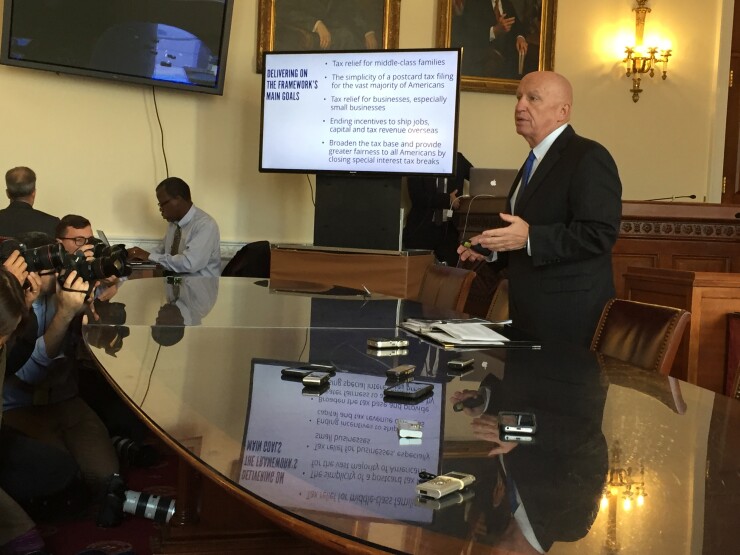Want unlimited access to top ideas and insights?
WASHINGTON – Municipal bond market participants and infrastructure advocates were stunned and unhappy on Wednesday when House Republicans released a tax bill that would terminate private activity bonds and advance refunding bonds after this year.
Lawmakers had told them that munis were likely “safe” from dramatic cuts in the bill and top administration officials had said that PABs might be expanded and subject to looser tax restrictions so they could be used for infrastructure projects involving private parties.

Treasury Secretary Steven Mnuchin had talked about “enhancing” PABs during his confirmation process. The Treasury Department had just proposed public notice and approval requirements for PABs and last month and released a priority guidance plan for 2017-2018 that said it was working on guidance for PABs.
“We’ve had over 90 Hill meetings and there was absolutely no talk of advance refundings, private activity bonds, or tax credit bonds,” said Emily Brock, director of the federal liaison center for the Government Finance Officers Association.
“The infrastructure stakeholder community appears to be blindsided by this,” said one transportation expert who did not want to be named.
Brock said the proposed termination of PABs doesn’t seem in line with the administration’s infrastructure statements. “It does seem to beg the question of [what was the] coordination between Congress and the White House.”
Termination of advance refundings would hurt governmental bonds. Under current law, governmental bonds are allowed one advance refunding. Brock said advance refundings help issuers when interest rates plummet. They can advance refunding their bonds and reap considerable savings so they are not stuck with the higher coupon bonds. Sometimes advance refundings are needed to change covenants in bond documents that become outdated
Bond Dealers of America CEO Mike Nicholas commended the House leadership for maintaining the tax exemption for muni bonds, but said, “It is disappointing, however, to see the provision to eliminate tax-exempt private-activity bonds, including all 501c3 bonds, and municipal bond advance refundings, which have a long and proven history of reducing issuance costs for state and local governments when issuing debt for capital improvement projects.”
The PAB and advance refunding proposals in the House GOP’s Tax Cuts and Jobs Act could significantly shrink the muni bond market, sources said. PABs make up 15% to 20% of the muni market, they said. Advance refundings vary widely depending on interest rates, but three years ago they represented half of all new muni issuances, they said.
Tax experts said the committee staff was probably grabbing for revenue raisers at the last minute to make up for the rate cuts, especially the proposed cut from 35% to 20% in the corporate rate. They noted that former House Ways and Means Committee chair Dave Camp, R-Mich. also proposed to eliminate PABs and advance refundings in the tax plan he floated in 2014.
The Joint Committee on Taxation estimated the termination of PABs would raise $38.9 billion in revenues from 2018-2027. It found the halt to advance refundings would provide $17.3 billion in revenues over 10 years.
The bill would also eliminate tax credit bonds after this year, for a revenue gain of $500 million, and prohibit the use of tax-exempt bonds for professional sports stadiums as of Nov. 2, 2017, for a gain of $200 million of revenues over 10 years.
While the tax-exemption for municipal bonds would not be altered, the desirability of munis as an investment would be diminished somewhat because the threshold for the 39.6% income tax rate would climb. Republicans propose raising it to $1 million from the scheduled 2018 threshold of $426,700 for individuals and $480,050 for married couples filing jointly.
The bill also would put new limits on the federal deductibility of state and local taxes. It would limit the deductibility of property taxes to $10,000 annually while other state and local taxes would be deductible only for households with incomes under $400,000.
The mortgage interest deduction, another key component for households that claim the SALT deduction, would be capped for future mortgage loans of $500,000. Current mortgages would be grandfathered.
Households would get a larger standard deduction of $24,000 for families and $12,000 for individuals. Personal exemptions would be replaced with a $300 credit for adults and a larger credit tax credit of $1,600 instead of the current $1,000.
The committee defended its proposed termination of PABs, saying In its section-by-section analysis of the bill: “The federal government should not subsidize the borrowing costs of private businesses, allowing them to pay lower interest rates while competitors with similar creditworthiness but that are unable to avail themselves of PABs must pay a higher interest rate on the debt they issue.”
But many market participants were surprised the House GOP proposed to indiscriminately eliminate all PABs.

“Many people might not realize that this would include bonds for airport projects, affordable and low-income housing, nonprofit hospitals and nonprofit colleges and universities,” said Sandy MacLennan, president of the National Association of Bond Lawyers and a lawyer at Squire Patton Boggs.
“This proposal strikes a cruel blow to thousands of charities of all size from colleges to hospitals from walk in clinics to sheltered workshops and boys clubs,” said Chuck Samuels, a lawyer at Mintz Levin who is counsel to the National Association of Health & Higher Education Facilities Authorities. “It is unjustified, doesn’t raise much money and undermines infrastructure efforts. I hope it is quickly reversed.”
House Republican leaders have said the Ways and Means Committee will start deliberations on the bill on Monday and may take several days for that and voting, despite complaints from Democrats that this leaves little time to scrutinize the bill. The full House vote would come after that.
The Senate Finance Committee plans to release its own tax bill after the committee’s action. But Micah Green, a partner at Steptoe & Johnson, said that if the basic rates and parameters remain the same as in the House bill, he can’t see how the bill in the Senate could be that much different. “It could be a different set of oxes gored,” he said, referring to revenue raisers.
Senate Republicans have not yet decided whether to keep the tax exemption for PABs, according to Sen. Rob Portman, R-Ohio, a member of the Finance Committee. “We haven’t made any of those decisions yet,” Portman told The Bond Buyer. “We’re pleased with the basic framework of those House bill. I think it will keep the momentum going for good tax reform, but I haven’t looked at that issue yet.”
Senate Majority Whip John Cornyn, R-Texas, another member of the Senate Finance Committee said, “It’s just the beginning of the process and I suspect the Senate will have a different bill."
The top ranking Democrats on the House and Senate committees with tax jurisdiction defended PABs for their role in building infrastructure and providing economic stimulus during the Great Recession.
Rep. Richard Neal of Massachusetts, ranking Democrat on the House Ways and Means Committee, introduced legislation earlier this week with 19 other House Democrats to create a new category of tax-exempt private-activity bonds to be used for reconstruction and rehabilitation following natural disasters.
Neal said that “anybody who’s been through an airport in America” that expanded in the last four or five years has seen the results of the use of PABs or Build America Bonds.
Neal said House Republicans have “shaved back the exemption on municipal bonds,” which will make them not as attractive an investment as they once were. “So I can’t wait until mayors and others begin to take a look at this information,” Neal said.
“I wrote the Build America Bonds program in 2009,” said Sen. Ron Wyden of Oregon, ranking Democrat on the Senate Finance Committee. “And everybody thought you might sell a few bonds. We sold $181 billion worth of Build America Bonds and I will tell you given the fact the president said, ‘I am a private business guy. I’m a builder. We’ve got to fix our roads and bridges.’ The fact that he has no infrastructure – roads and bridges and transportation systems – is in my view legislative malpractice.”
Sen. Richard Blumenthal, D-Conn. said, “I’m very skeptical about that kind of change in the tax code that discourages infrastructure building at a time when we desperately need to repair and reconstruct and build anew our ports, airports, a lot of facilities that are supported by that kind of financing.” He added, “I have no idea how they can put together an infrastructure program if they fail to consider the tax consequences.”





